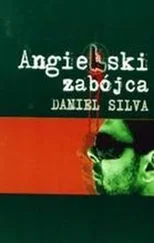“Did you know that Radek was linked to Einsatzgruppen activities in the Ukraine?” Gabriel asked. “Did you know that this bright, energetic young man had tried to conceal the greatest crime in history?”
Carter shook his head. “The scale of the German atrocities wasn’t known then. As for Aktion 1005, no one had heard the term yet, and Radek’s SS file never reflected his transfer from the Ukraine. Aktion 1005 was a top-secret Reich matter, and top-secret Reich matters weren’t put to paper.”
“But surely, Mr. Carter,” Chiara said, “General Gehlen must have known about Radek’s work?”
Carter raised his eyebrows, as though surprised by Chiara’s ability to speak. “He might have, but then, I doubt it would have made much difference to Gehlen. Radek wasn’t the only former SS man who ended up working for the Org. At least fifty others found work there, including some, like Radek, who were linked to the Final Solution.”
“I’m afraid it wouldn’t have made much of a difference to Gehlen’s controllers either,” Shamron said. “Any bastard, as long as he’s anti-Communist. Wasn’t that one of the Agency’s guiding principles when it came to the recruitment of Cold War agents?”
“In the infamous words of Richard Helms, ‘We’re not in the Boy Scouts. If we’d wanted to be in the Boy Scouts, we would have joined the Boy Scouts.’ ”
Gabriel said, “You don’t sound terribly distressed, Adrian.”
“Histrionics are not my way, Gabriel. I’m a professional, like you and your legendary boss over there. I deal with the real world, not the world as I would like it to be. I make no apologies for the actions of my predecessors, just as you and Shamron make no apologies for yours. Sometimes, intelligence services must utilize the services of evil men to achieve results that are good: a more stable world, the security of the homeland, the protection of valued friends. The men who decided to employ Reinhard Gehlen and Erich Radek were playing a game as old as time itself, the game of Realpolitik, and they played it well. I won’t run from their actions, and I sure as hell won’t let you of all people sit in judgment of them.”
Gabriel leaned forward, his hands folded, his elbows on his knees. He could feel the heat of the fire on his face. It only fueled his anger.
“There’s a difference between using evil individuals as sources and hiring them as intelligence officers. And Erich Radek was no run-of-the-mill killer. He was a mass murderer.”
“Radek wasn’t directly involved in the extermination of the Jews. His involvement came after the fact.”
Chiara was shaking her head, even before Carter had completed his answer. He frowned. Clearly, he was beginning to regret her inclusion in the proceedings.
“You wish to take issue with something I said, Miss Zolli?”
“Yes, I do,” she said. “Obviously you don’t know much about Aktion 1005. Whom do you think Radek used to open those mass graves and destroy the bodies? What do you think he did with them when the work was done?” Greeted by silence, she announced her verdict. “Erich Radek was a mass murderer, and you hired him as a spy.”
Carter nodded slowly, as if conceding the match on points. Shamron reached over the back of the couch and placed a restraining hand on Chiara’s shoulder. Then he looked at Carter and asked for an explanation of Radek’s false escape from Europe. Carter seemed relieved by the prospect of virgin territory. “Ah, yes,” he said, “the flight from Europe. This is where it gets interesting.”
ERICH RADEK QUICKLY became General Gehlen’s most important deputy. Eager to protect his star protégé from arrest and prosecution, Gehlen and his American handlers created a new identity for him: Ludwig Vogel, an Austrian who had been drafted in the Wehrmacht and had gone missing in the final days of the war. For two years, Radek lived in Pullach as Vogel, and his new identity seemed airtight. That changed in the autumn of 1947, with the beginning of Case No. 9 of the subsequent Nuremburg proceedings, the Einsatzgruppen trial. Radek’s name surfaced repeatedly during the trial, as did the code name of the secret operation to destroy the evidence of the Einsatzgruppen killings:Aktion 1005.
“Gehlen became alarmed,” Carter said. “Radek was officially listed as missing and unaccounted for, and Gehlen was eager that he remain that way.”
“So you sent a man to Rome posing as Radek,” Gabriel said, “and made sure you left enough clues behind so that anyone who went looking for him would follow the wrong trail.”
“Precisely.”
Shamron, still pacing, said, “Why did you use the Vatican route instead of your own Ratline?”
“You’re referring to the Counterintelligence Corps Ratline?”
Shamron closed his eyes briefly and nodded.
“The CIC Ratline was used mainly for Russian defectors. If we’d sent Radek down the line, it would have betrayed the fact he was working for us. We used the Vatican route to enhance his credentials as a Nazi war criminal on the run from Allied justice.”
“How clever of you, Adrian. Pardon my interruption. Please continue.”
“Radek disappeared,” Carter said. “Occasionally, the Org fed the story of his escape by slipping false sightings to the various Nazi hunters, claiming that Radek was in hiding in various South American capitals. He was living in Pullach, of course, working for Gehlen under the name Ludwig Vogel.”
“Pathetic,” Chiara murmured.
“It was 1948,” Carter said. “Things were different by then. The Nuremberg process had run its course, and all sides had lost interest in further prosecutions. Nazi doctors had returned to practice. Nazi theoreticians were lecturing again in the universities. Nazi judges were back on the bench.”
“And a Nazi mass murderer named Erich Radek was now an important American agent who needed protection,” Gabriel said. “When did he return to Vienna?”
“In 1956, Konrad Adenauer made the Org the official West German intelligence service: the Bundesnachrichtendienst, better known as the BND. Erich Radek, now known as Ludwig Vogel, was once again working for the German government. In 1965, he returned to Vienna to build a network and make certain the new Austrian government’s official neutrality remained tilted firmly toward NATO and the West. Vogel was a joint BND-CIA project. We worked together on his cover. We cleaned up the files in the Staatsarchiv. We created a company for him to run, Danube Valley Trade and Investment, and funneled enough business his way to make certain the firm was a success. Vogel was a shrewd businessman, and before long, profits from DVTI were funding all of our Austrian nets. In short, Vogel was our most important asset in Austria -and one of our most valuable in Europe. He was a master spy. When the Wall came down, his work was done. He was also getting on in years. We severed our relationship, thanked him for a job well done, and parted company.” Carter held up his hands. “And that, I’m afraid, is where the story ends.”
“But that’s not true, Adrian,” Gabriel said. “Otherwise, we wouldn’t be here.”
“You’re referring to the allegations made against Vogel by Max Klein?”
“You knew?”
“Vogel alerted us to the fact that we might have a situation in Vienna. He asked us to intercede and make the allegations go away. We informed him that we couldn’t do that.”
“So he took matters into his own hands.”
“You’re suggesting Vogel ordered the bombing at Wartime Claims and Inquiries?”
“I’m also suggesting he had Max Klein murdered in order to silence him.”
Carter took a moment before answering. “If Vogel is involved, he’s worked through so many cutouts and front men you’ll never be able to pin a charge on him. Besides, the bombing and Max Klein’s death are Austrian matters, not Israeli, and no Austrian prosecutor is going to open a murder investigation into Ludwig Vogel. It’s a dead end.”
Читать дальше












